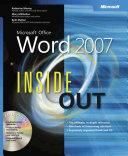
Microsoft Office Word 2007 Inside Out
Demonstrates the updated features of the word processing program, explaining how to perform such tasks as integrate documents with other Microsoft Office applications, customize the program, and post documents to the Web.
- ISBN 13 : 9780735623309
- ISBN 10 : 0735623309
- Judul : Microsoft Office Word 2007 Inside Out
- Pengarang : Katherine Murray, Mary Millhollon, Beth A. Melton, Mary Millhollon, Beth A. Melton, Mary Millhollon, Beth A. Melton,
- Kategori : Computers
- Bahasa : en
- Tahun : 2007
- Halaman : 868
- Google Book : http://books.google.com/books?id=KNy8AQAACAAJ&dq=intitle:microsoft+office+word&hl=&source=gbs_api
-
Ketersediaan :
Demonstrates the updated features of the word processing program, explaining how to perform such tasks as integrate documents with other Microsoft Office applications, customize the program, and post documents to the Web.








